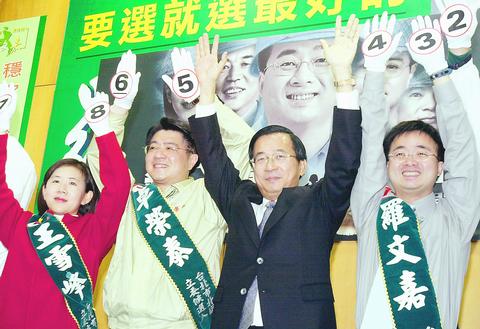President Chen Shui-bian (
The DPP's vote-allocation system, which aims to spread votes evenly between candidates and therefore maximize the number of seats won, involves requesting supporters to vote for specific candidates in multi-member constituencies in a methodical way.
Vote-allocation systems have proved effective for both the DPP and the New Party in past legislative elections.

PHOTO: CHIANG YING-YING, TAIPEI TIMES
Vote allocation requires candidates to avoid emphasizing themselves over other candidates from their party and asks voters to ignore their personal preferences for any candidate but the party's designee.
Chen attended a press conference held by his former aide, Lo Wen-chia (
"I appreciate all of my supporters, but I would like to appeal to them to vote for the candidates they are assigned to vote for," Lo said.
The DPP nominated five candidates in each of Taipei's two constituencies this year, but the party started worrying about whether the 10 can all be elected since polls have shown that only five to seven candidates are receiving enough support to get elected.
Chen, however, believes that vote-allocation will make a difference.
"The DPP has a stable constituency in Taipei. If we practice vote-allocation correctly, the 10 nominees in Taipei City will all be elected," Chen said at the press conference.
The DPP officially announced the vote-allocation policy in Taipei's two constituencies on Nov. 13, followed by the same announcement in other areas of the country. The policy, though, has caused disputes between the party's nominees, because most of them are afraid that distributing votes to other candidates would result in a loss for themselves.
"I am afraid I will not receive enough votes to win the election. How can I allocate my support to other candidates?" said Mark Chen (
In a reaction to arguments from the party's candidates, DPP secretary-general Wu Nai-jen (
"The DPP's supporters would like to see the party win the majority," Wu said.

ACTION PLAN: Taiwan would expand procurement from the US and encourage more companies to invest in the US to deepen bilateral cooperation, Lai said The government would not impose reciprocal tariffs in retaliation against US levies, President William Lai (賴清德) said yesterday, as he announced five strategies to address the issue, including pledging to increase Taiwanese companies’ investments in the US. Lai has in the past few days met with administrative and national security officials, as well as representatives from various industries, to explore countermeasures after US President Donald Trump on Wednesday last week announced a 32 percent duty on Taiwanese imports. In a video released yesterday evening, Lai said that Taiwan would not retaliate against the US with higher tariffs and Taiwanese companies’ commitments to

‘SPECIAL CHANNEL’: Taipei’s most important tasks are to stabilize industries affected by Trump’s trade tariffs and keep negotiations with Washington open, a source said National Security Council Secretary-General Joseph Wu (吳釗燮) arrived in the US for talks with US President Donald Trump’s administration, a source familiar with the matter said on Friday. Wu was leading a delegation for a meeting known as the “special channel,” the Financial Times reported earlier. It marked Trump’s first use of the channel since returning to the White House on Jan. 20. Citing a source familiar with the matter, the Financial Times reported that Minister of Foreign Affairs Lin Chia-lung (林佳龍) was also a part of the delegation. The visit came days after China concluded war games around Taiwan and amid Trump’s

CHIP EXCEPTION: An official said that an exception for Taiwanese semiconductors would have a limited effect, as most are packaged in third nations before being sold The Executive Yuan yesterday decried US President Donald Trump’s 32 percent tariff on Taiwanese goods announced hours earlier as “unfair,” saying it would lodge a representation with Washington. The Cabinet in a statement described the pledged US tariffs, expected to take effect on Wednesday next week, as “deeply unreasonable” and “highly regrettable.” Cabinet spokeswoman Michelle Lee (李慧芝) said that the government would “lodge a solemn representation” with the US Trade Representative and continue negotiating with Washington to “ensure the interests of our nation and industries.” Trump at a news conference in Washington on Wednesday announced a 10 percent baseline tariff on most goods

Intelligence agents have recorded 510,000 instances of “controversial information” being spread online by the Chinese Communist Party (CCP) so far this year, the National Security Bureau (NSB) said in a report yesterday, as it warned of artificial intelligence (AI) being employed to generate destabilizing misinformation. The bureau submitted a written report to the Legislative Yuan in preparation for National Security Bureau Director-General Tsai Ming-yen’s (蔡明彥) appearance before the Foreign Affairs and National Defense Committee today. The CCP has been using cognitive warfare to divide Taiwanese society by commenting on controversial issues such as Taiwan Semiconductor Manufacturing Co’s (TSMC, 台積電) investments in the